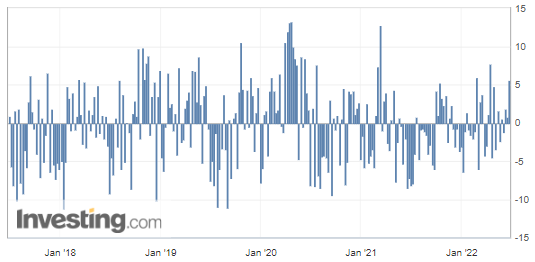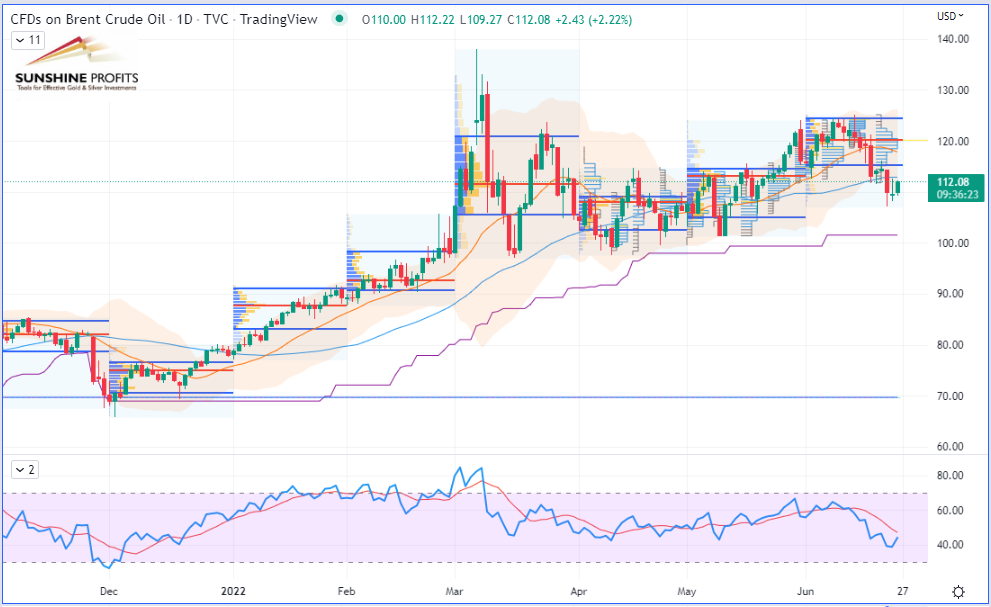What outcome or outlook for crude oil should we expect when looking at the current macroeconomic environment?
Recession Fears
Oil prices were up during the US session on Friday as fears of insufficient crude oil supply to meet demand during the summer took precedence over those of a recession amid runaway inflation.
Markets fear that economic activity slow will lead to lower global demand. In addition, growth in economic activity in the Eurozone slowed sharply in June – notably in the private sector – to its lowest level in 16 months due to inflation, according to the composite PMI index published on Thursday by S&P Global.
Comments by Federal Reserve Chairman Jerome Powell have also fueled fears of a global slowdown since the Fed's chairman has not ruled out the risk of recession in the United States.
Indeed, the head of the US Federal Reserve, heard Thursday by the Finance Committee of the House of Representatives, repeated that his priority remained the fight against inflation:
"We're going to want to see evidence that it really is coming down before we declare 'mission accomplished."
Finally, while addressing an audience's question about whether the war was responsible for inflation, Powell answered:
"No, inflation was high before – certainly before the war in Ukraine broke out."
Here is an interesting article published on FXStreet that summarizes some of Powell's remarks in Congressional testimony.
In addition, according to several media, Joe Biden's proposal to temporarily lift the federal tax on gasoline and diesel did not have sufficient support to be adopted in Congress (a mandatory step).
Fundamental Analysis
In a rare occurrence, plagued by technical issues, the US Energy (NASDAQ:USEG) Information Agency (EIA) has announced that it will not release weekly US oil inventory and oil inventory figures this week. So, let's look at the statistics from the American Petroleum Institute.
US API Weekly Crude Oil Stock
The weekly commercial crude oil reserves in the United States increased by over 5.607M barrels. At the same time, the forecasted figure was expected to be in negative territory (-1.433M), according to figures released on Wednesday by the US American Petroleum Institute (API).

US crude inventories have increased by over 5.607 million barrels, which firmly confirms slowing demand and could be considered a strong bearish factor for crude oil prices. This figure would indeed signal a drop in Americans' appetite—at least at the current fuel prices—for petroleum products.
Source: Investing.com

To conclude, is it even worth pointing out that in the event of a recession, the demand for petroleum products would fall, the current astronomical refinery margins would collapse, and therefore, a key bullish factor for crude oil would certainly vanish?
* * * * *
The information above represents analyses and opinions of Sebastien Bischeri, & Sunshine Profits' associates only. As such, it may prove wrong and be subject to change without notice. At the time of writing, we base our opinions and analyses on facts and data sourced from respective essays and their authors. Although formed on top of careful research and reputably accurate sources, Sebastien Bischeri and his associates cannot guarantee the reported data's accuracy and thoroughness. The opinions published above neither recommend nor offer any securities transaction. Mr. Bischeri is not a Registered Securities Advisor. By reading Sebastien Bischeri’s reports you fully agree that he will not be held responsible or liable for any decisions you make regarding any information provided in these reports. Investing, trading and speculation in any financial markets may involve high risk of loss. Sebastien Bischeri, Sunshine Profits' employees, affiliates as well as their family members may have a short or long position in any securities, including those mentioned in any of the reports or essays, and may make additional purchases and/or sales of those securities without notice.
